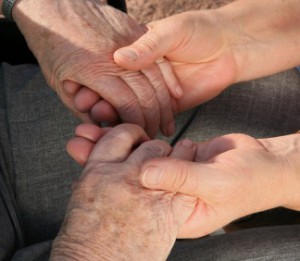One of the commitments from the recent G8 dementia summit held in London in December 2013, was to support countries to strengthen health and social care systems, with the aim to improve care and services for people with dementia.
A research article, published today in open access journal Alzheimer’s Research and Therapy, shows that a care coordination programme for patients with Alzheimer’s disease and their carers resulted in improvements in psychosocial function of people with dementia. The programme, a partnership between community and health organisations, also showed positive results for carers.
The programme, called Partners in Dementia Care (PDC), is a partnership between healthcare and community agencies that provides care coordination for medical and non-medical needs of both patients and carers.
Co-authors Drs. David Bass, Benjamin Rose Institute on Aging, and Mark Kunik, US Department of Veterans Affairs explain what can be learnt from the study:
“This study is an example of the cr ucial role that non-pharmacological programs and interventions can play in improving care for people with dementia and their family caregivers. More specifically, this investigation showed the Partners in Dementia Care program had similar beneficial effects for a larger more diverse sample of persons with dementia, as well as their caregivers, as it did in a smaller efficacy trial.
ucial role that non-pharmacological programs and interventions can play in improving care for people with dementia and their family caregivers. More specifically, this investigation showed the Partners in Dementia Care program had similar beneficial effects for a larger more diverse sample of persons with dementia, as well as their caregivers, as it did in a smaller efficacy trial.
It also demonstrated that a large segment of persons with dementia were able to provide valid and reliable information about the impact of this devastating disease on quality of life, including their relationship with family members, social isolation, and symptoms of depression.
Baseline interviews were conducted with 333 patients, 263 of whom completed six month follow-ups and 194 had 12-month follow-ups. Those on the care programme had significantly less adverse outcomes at six months than those receiving usual care, particularly for more impaired patients. This included: reduced relationship strain and depression, reduced unmet need, and less embarrassment about memory problems. At 12 months, more impaired veterans had further reductions in unmet need. The authors explain the implications of the results for future studies:
“Results indicated health, well-being, and perceptions of the negative consequences of dementia, can be positively impacted by a quality program of support and information delivered primarily by telephone. Future studies will examine the feasibility of large-scale implementations of the Partners in Dementia program for different types of community settings, different types of partnerships between healthcare and community agencies and patients and caregivers with different chronic disorders other than dementia.”
The positive results of the PDC programme provide a potential to influence national policy in the US, as well as providing an example of a care coordination programme that could be adopted internationally. The authors explain:
“As the program is delivered primarily by telephone and computer, it may be a valuable strategy for serving hard to reach rural populations and others who lack easy access to care. It has the potential to influence national policy within the US, by representing an effective methodology for bridging and linking healthcare and community services.”
View the full article here.
Alzheimer’s Research & Therapy is an international, peer-reviewed journal with an Impact Factor of 4.39. All of the research articles in Alzheimer’s Research & Therapy are open access. To access all subscription content, including peer-reviewed reviews, commentaries, debates and viewpoints, register for a free trial to the journal. To keep up to date with the latest articles published in the journal, sign up for Article Alerts and follow us on Twitter.

Comments